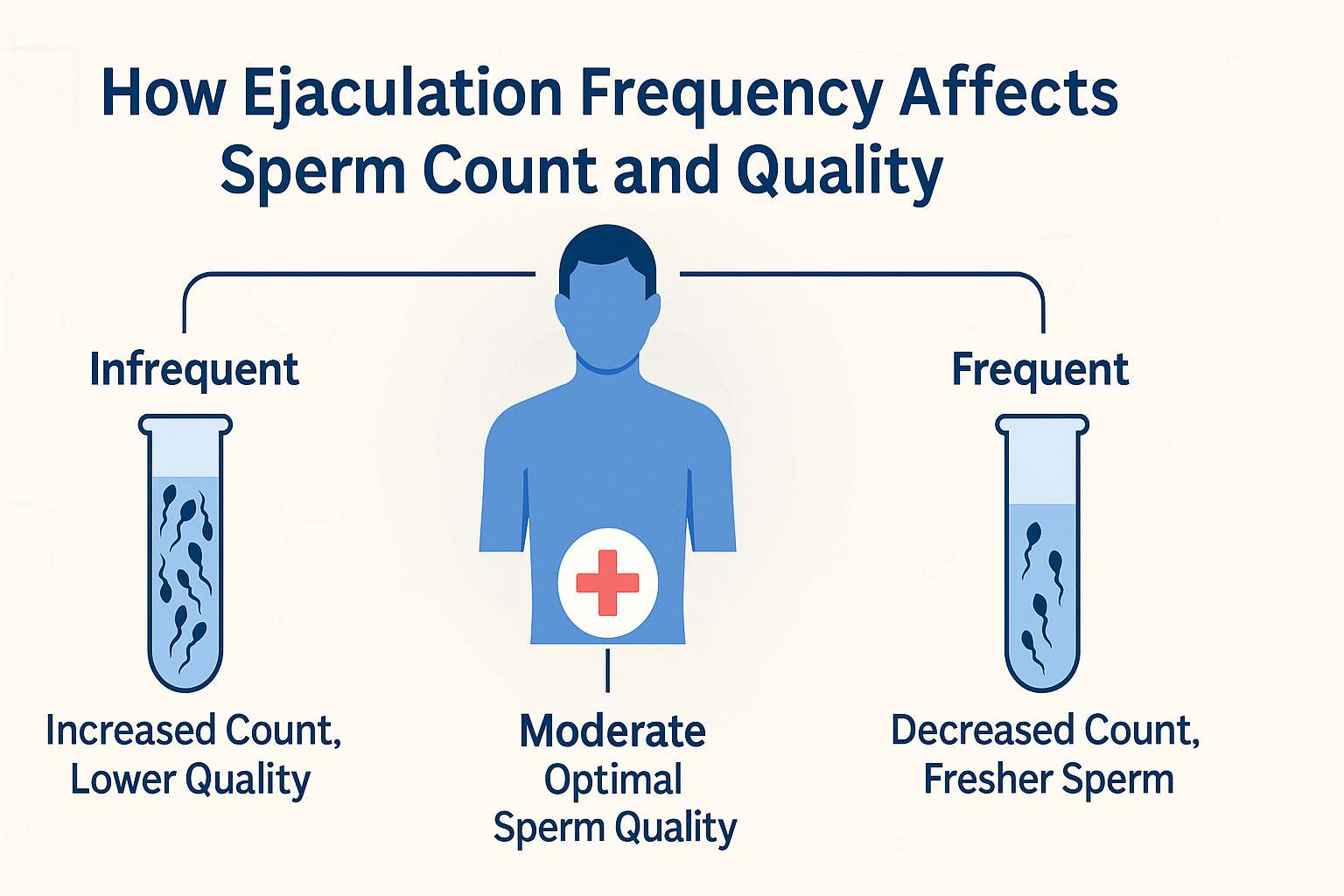Ever wondered whether you are helping or hurting your chances of becoming a father? It is all a matter of timing. When your partner tracks ovulation cycles and eats fertility-boosting diets, you may be ignoring one of the most manageable aspects of male reproduction. Ejaculation isn’t just about pleasure or stress relief; it directly influences the swimming sperm. According to the studies, the male reproductive system works on a balance, where too frequent or too infrequent ejaculation can both affect fertility outcomes. Ejaculation and fertility are two related terms, and men need to know that their habits affect their reproductive potential.
A male body continuously produces sperm, but the quality and concentration of that sperm are highly contingent upon the pattern of ejaculation frequency. Let’s take a look at how it affects sperm count and quality.
The science behind sperm production
Sperm production is a long process that takes a 74-day journey, known as spermatogenesis. The testicles are active, producing about 300 million sperm every day. Those newly formed sperm take weeks to mature and acquire the motility to reach an egg successfully. These mature sperm are stored in the epididymis over several weeks, during which the sperm acquire their motility and reach their full reproductive potential.
Fresh sperm have better motility and DNA integrity than sperm that have been stored for a long time. If sperm appear abnormal in shape, colour, or movement, it may indicate early signs of unhealthy sperm. This biological process explains why ejaculation timing matters for couples trying to conceive.
How daily ejaculation impacts sperm count
Frequent ejaculation creates temporary changes in sperm concentration and quality. A male masturbating or engaging in intercourse daily will temporarily reduce sperm concentration in each ejaculate in comparison with those who abstain for several days. However, this doesn’t necessarily mean their overall fertility is affected. A semen analysis can confirm if sperm parameters remain within a healthy range despite frequent ejaculation.
Here’s what happens with daily ejaculation:
- Sperm concentration drops with each ejaculation
- Semen volume decreases
- Individual sperm may actually swim better due to freshness
- Overall fertility potential remains intact despite lower numbers
Ejaculation effects on sperm count are temporary and reversible. The body adjusts production according to ejaculation patterns, though it requires time to rebuild sperm.
Determining the ejaculation frequency for fertility
1. The two-to-three-day strategy
Fertility experts have cracked the code that ejaculating every 2-3 days gives you the best of both worlds. This timing allows your body to replenish sperm while preventing older sperm from accumulating and losing their quality.
2. Daily vs. long abstinence
How often should a man ejaculate for healthy sperm? This question is very common and is the most asked. Therefore, it depends on your specific situation. Daily release keeps everything fresh but reduces concentration. Prolonged abstinence beyond a week can backfire; those stored sperm start developing DNA damage and lose their swimming ability.
3. The motility connection
Ejaculation and sperm motility share an interesting combination. Sperm motility is the swimming pattern of sperm, which often improves with regular ejaculation. Sperm that sits around too long may develop motility issues, which makes conception more difficult.
Effects of multiple ejaculations on sperm count
Does ejaculating multiple times reduce sperm count? No, it is not permanent damage. The initial ejaculation has the most mature sperm, and the number reduces with successive ejaculations.
Many men ask, “How much sperm is produced in 24 hours”? On average, the testicles produce 300 million sperm cells per day. However, the new sperm that is formed is not yet ready to fertilise; it takes weeks to become fully mature. During this period, changes in semen volume or a shift from the typical healthy semen colour can also occur, which is completely normal.
This temporary loss will not damage your future fertility, but untimed multiple ejaculations during your partner’s fertile period may lower the chances of conception.
Conclusion
Ejaculation frequency should be personal and based on age, health status, or fertility objectives. Men with low sperm count may need a specific strategy that is not the same as general guidelines. Lifestyle factors like smoking, alcohol, and drugs affect sperm health too, making it essential to balance habits alongside ejaculation frequency.
Nevertheless, both extremes, overfrequency and too long abstinence, are harmful to fertility. Normal ejaculation patterns that are moderately well-timed and regular are most effective in the majority of couples that maintain sperm fresh and have enough concentrations to conceive.
Do you need guidance and advice regarding your fertility, or are you worried? Contact The Male Fertility Clinic, a reliable and professional service provider with experience helping over 5,000 men.


